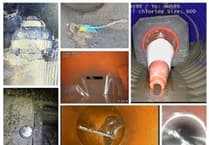A PARAMEDIC from Camelford is urging people to take note of where their nearest defibrillators are, following a recent incident in the centre of town, writes Rosie Cripps.
Charlotte Hicks, in addition to her paramedic role, supports the local volunteer network of community first responders across North Cornwall.
These volunteers receive a series of training sessions to enable them to respond ahead of an ambulance to public incidents, such as a cardiac arrest. They are provided with a kit, defibrillator and pager, and when such an incident occurs, they are mobilised by the ambulance service to the incident.
However, Charlotte told the Post that the ambulance service would like to increase the number of these vital volunteers, as well as common knowledge of what to do when an incident occurs both in public and in the home.
Speaking about a particular incident that occurred in Camelford recently, she explained that whilst at work, a call had come in stating that a member of the public had fallen unconscious in the centre of town.
Charlotte and another individual were mobilised to the incident, and travelled to attend the casualty. The patient was on the floor and wasn’t breathing.
There were a number of public bystanders, one of which had attended the casualty prior to Charlotte’s arrival.
With no knowledge of the casualty suffering a cardiac arrest, the bystander had placed the unconscious person into the recovery position.
It is thought that the patient’s breathing stopped later, before Charlotte’s arrival, but that they could have been breathing normally beforehand, although this is not known for certain.
Charlotte said: “When you’re dying, your breathing can go from 16 breaths per minute to about three or four — so odd gasps, which are sometimes known as the ‘death rattle’. When you’re not breathing properly, this can lead to your heart stopping.”
Charlotte added: “After the patient was placed into the recovery position, their breathing stopped and their heart then stopped because of that. The patient may well have been breathing before, but their breathing later stopped. We luckily got there, dealt with them professionally and then off they went.”
Paramedics treated the patient, who later regained consciousness.
Charlotte’s main concern, whilst dealing with the incident, was that of the people who were at the scene, not one of them knew where the nearest public access defibrillator was located — outside the town’s Conservative Club.
She said: “The point I’m trying to make is that here we have a defibrillator in our town, and no-one knows about it. It really is quite worrying.”
South Western Ambulance Service hold a central list of working defibrillators.
A spokesperson from South Western Ambulance Service NHS Foundation Trust said: “When a 999 call is made and the patient is identified as in cardiac arrest, if there is a nearby defibrillator the call handler will inform the caller where the nearest working and available defibrillator is, but only if it is registered with the ambulance service.”
A defibrillator will only deliver a shock to a patient if the rhythm of their heart sends signals to the machine, suggesting that the heart needs it. However, even if the heart does not require a shock, the defibrillator will guide the individual on chest compressions, telling them when to press the machine, how to use it and more.
Charlotte added: “It certainly does help the situation. But people just don’t seem to know about them.”
Another public access defibrillator, recently supplied by the Camelford Rotarians, is located at Bowood Golf Club, in their reception area. This is only available during the golf club’s opening hours. There are more of the machines in Tintagel, and there is also one available in Delabole.
Charlotte said: “Most towns now have a defibrillator. Boscastle was the first place to have one in our area.”
She has now arranged for a basic first aid session to take place at the Old Bank in Camelford.
This two-hour session will take place at the Old Bank from 2pm until 4pm on Thursday, November 9. It is a free, drop-in session, with people interested in attending able to drop in for a ten-minute training session in basic CPR and how to use a defibrillator.
Charlotte said: “I’ve done the WI and Rotary Club (provided training for), but it’s just me — I can’t do all this by myself. I teach kids in all the schools, but it’s the adults that need it too — it appears that people are scared to step in without CPR training.”
She added: “Basically, as far as the public are concerned, a patient did collapse, there was an initially helpful bystander who put them into the recovery position. Unfortunately, the patient did stop breathing, but did regain consciousness at the hospital. The patient had the highest chance of survival as possible that day.
“One thing to remember is every minute that passes without a defibrillator, ten per cent of survival is lost.”
Defibrillators in the Camelford area include: Blisland Community Store, St Tudy Post Office and Stores, St Mabyn Post Office and Stores, St Breward Stores, The White Hart Inn in St Teath, the Bettle and Chisel Inn in Delabole, Camelford Conservative Club, Bowood Golf Club, The King Arthur Arms in Tintagel, Bossiney House Hotel, Treknow Village Hall and the Boscastle Spar Shop.
These particular defibrillators are listed with the South Western Ambulance Services NHS Foundation Trust through an AED locator supplier, who has been working with FLEET.
People wanting to learn basic CPR and how to use their local defibrillator should drop in for their ten-minute session at the Old Bank on Thursday, November 9, between 2pm and 4pm.





Comments
This article has no comments yet. Be the first to leave a comment.